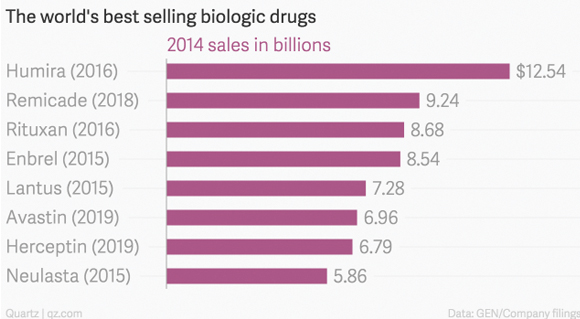In the past few years, you mostly likely have come across advertisements in the media for new medications for the treatment of psoriasis, rheumatoid arthritis, Crohn’s disease, and cancer. The TV commercials are shown mostly during news programs and on Sunday mornings. These medications are targeted to an older demographic that is more likely to have these kinds of chronic illnesses and who have the money and insurance to pay for them.
Instead of chemical compounds that interfere with cellular reaction, these new medications are biological response modifiers. They tinker with the machinery of the immune system. The body’s cells produce these substances in small amounts to fight off infection and disease. Scientists are now able to produce large quantities of these outside the body and then administer them to treat autoimmune disease and cancer.
Biological therapies include monoclonal antibodies, interferon, interleukin-2, and tumor necrosis factor. Biological drugs have complex structures, are highly specific and are difficult and expensive to make. A biological drug requires many more complex processing and testing steps compared to conventional drugs.
“Biologics” is a term used for therapies that involve the use of recombinant DNA technology. The medications are grouped in three types.
Substances that are identical to that produced by the body: erythropoietin (blood stimulating protein), growth hormone and insulin. Monoclonal antibodies that are similar to those produced by the body to fight infection but are specifically altered to target a specific cell type: rheumatoid arthritis, psoriasis, Crohn’s disease, ulcerative colitis, breast cancer and asthma. Receptor constructs (fusion proteins) are protein receptors that are linked to an immunoglobulin. The receptor provides the message to the cell while the immunoglobulin creates a stable connection. These are highly bioengineered proteins and are used for rheumatoid arthritis and plaque psoriasis.
Production of biopharmaceuticals on a large scale maybe produced from microbial cells (E. coli), mammalian cell lines and plant cell lines. Controversial production methods involving transgenic organisms (genetically modified plants/animals) are on the horizon.
Monoclonal antibodies do not pass through the body like other chemical medications. They are not metabolized through the liver, are not affected by kidney function and do not interact with other medications taken at the same time. There are few drug-to-drug interactions. The drugs are given directly into the body and/or the bloodstream. The side effects of biological therapy depend on the type of treatment given. Upon infusion, side effects may include flu-like symptoms such as chills, fever, muscle aches, weakness, nausea, vomiting, diarrhea, and loss of appetite. Bleeding, bruising, swelling or rash may occur. These effects gradually improve over the course of treatment. Allergic and anaphylactic reactions have been reported. Long term side effects are rare and include an increased risk of infection, and malignancies. The risk appears to be low but only close vigilance, tracking and reporting these events post-marketing will be able to give us an accurate risk assessment. Most of these drugs now carry the black box warning, the FDA’s most stringent. Special precautions are necessary before starting these treatments. Testing for tuberculosis, hepatitis, avoiding all live virus immunizations, being infection free and having any elective surgery done prior to treatment is required. Biological medications increase the risk of infection and/or the reactivation of dormant ones. In some parts of the country where pulmonary fungal infections are more common, more precautions must be taken.
Future concerns include the manufacturing of “biosimilar” medications once the U.S. patent runs out. Recent Asian trade talks highlighted these concerns. Eventually, these medications will be produced generically in other countries at greatly reduced cost. What is unsure is whether or not these biosimilar medications will be as safe or as effective as their U.S counterparts. How will they be kept to the same high standards?
Nevertheless, many large well-known drug manufacturers are gobbling up as many small biotech companies as they can. Global market studies show that North America dominates the global biological drug market while low manufacturing costs in Asia are attracting the most biopharmaceutical investments and jobs. The high costs of these drugs along with the risk of side effects are the only factors inhibiting market growth.
The increased availability and use of these very expensive chronic treatments have already begun to drive up health care costs in the older population. These may lead to higher insurance premiums and copays that run counter to the wishes of government agencies to control medical expenditures. More expensive health plans run will the risk of being taxed as the Affordable Health Care Act unfolds in the coming years.
© 2020 The Juniper Park Civic Association Inc. All Rights Reserved.
SERVING MIDDLE VILLAGE AND MASPETH SINCE 1938.



